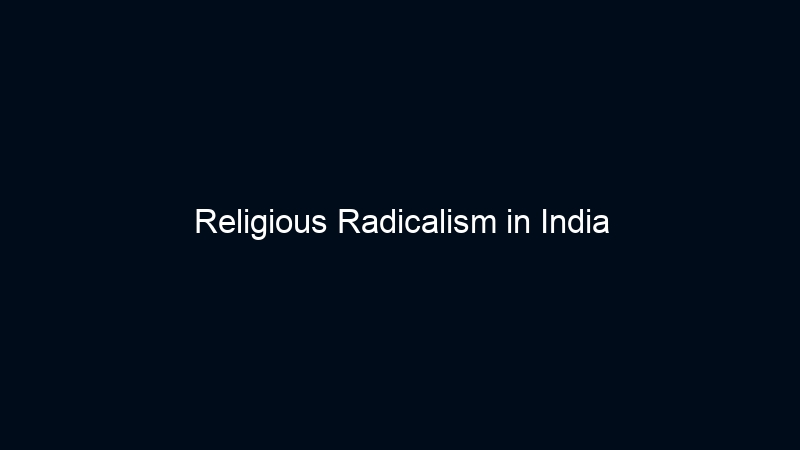India is a diverse country with a rich history and a variety of religious traditions. While the vast majority of people in India practice Hinduism, there are also significant populations of Muslims, Sikhs, Christians, Buddhists, Jains, and other religious groups. In general, India has a long tradition of religious tolerance and coexistence, but there have been instances of religious radicalism and extremism in the country.
What is Religious Radicalism?
Religious radicalism is an extreme form of religious belief that advocates the use of violence, coercion, or other means to achieve ideological goals. It involves the use of religious doctrines to justify acts of violence against those who do not share the same beliefs. Religious radicalism is not limited to any particular religion but can be found in various faiths worldwide.
Causes of Religious Radicalism in India
The causes of religious radicalism in India are complex and multifaceted. One of the primary reasons is the politicization of religion. Political parties often use religion as a tool to mobilize their vote bank and gain power, which can lead to the marginalization of certain religious communities.
Economic Factors: Socioeconomic factors such as poverty and unemployment can lead to frustration and disillusionment, which can be exploited by extremist groups to recruit members.
Religious Fundamentalism: The rise of religious fundamentalism in various faiths can also contribute to radicalism, as individuals become more entrenched in their beliefs and less tolerant of other perspectives.
Historical and Social Factors: Historical grievances, social inequality, and discrimination can also contribute to radicalism, as individuals seek to address perceived injustices through violence.
Globalization and the spread of extremist ideologies through the internet and social media have also contributed to the rise of religious radicalism in India. Radical groups have been able to spread their message and recruit members more easily through these platforms.
Effects of Religious Radicalism in India
Religious radicalism in India has had several negative effects on society. One of the most significant consequences is the rise of communal violence. Radical groups often target people, leading to riots and other forms of violence that can cause loss of life and property.
The rise of religious radicalism has also led to a decline in interfaith harmony and tolerance. People are becoming increasingly polarized and intolerant of those who belong to a different religion, which can lead to further social divisions.
In addition, the growth of religious radicalism has a negative impact on India’s international image. The country’s reputation as a diverse and tolerant society is at stake, which can affect its relations with other countries.
Political Instability: The polarization of communities along religious lines can lead to political instability, as politicians exploit these divisions for their own gain.
Economic Disruption: Communal violence and political instability can also disrupt economic activity, leading to job losses and reduced economic growth.
Solutions to Religious Radicalism in India
The solution to religious radicalism in India requires a multi-pronged approach. One of the most important steps is to address the root causes of radicalism, including social and economic inequality. Governments and civil society organizations need to work together to create more inclusive and equitable societies where people of all religions feel valued and respected.
Another solution is to promote interfaith harmony and dialogue. Interfaith initiatives can help to build bridges between different communities and promote understanding and tolerance. Religious leaders and organizations can play a vital role in this effort by promoting messages of peace and unity.
The government can also take steps to counter extremist ideologies by monitoring social media and online platforms and cracking down on hate speech and incitement to violence.
Education: Education can play a critical role in promoting social and economic equality, reducing poverty and unemployment, and countering extremist ideologies.
Media Responsibility: The media must act responsibly and avoid sensationalizing incidents of communal violence, which can exacerbate tensions between communities.
Parivesh Singh Gupta is the founder of TweeLabs, with over 12+ years of experience in digital marketing, SEO content writing, web development, and eCommerce solutions. He specializes in WordPress development, Meta & Google Ads, Shopify & WooCommerce, Canva-based design, and AI automation.
Parivesh helps startups and growing businesses achieve online success through high-converting strategies, powerful ad campaigns, and SEO-rich content that ranks.
For collaborations or consulting:
Email: parivesh@tweelabs.com
Website: www.tweelabs.com
Follow on LinkedIn: Parivesh Singh Gupta

